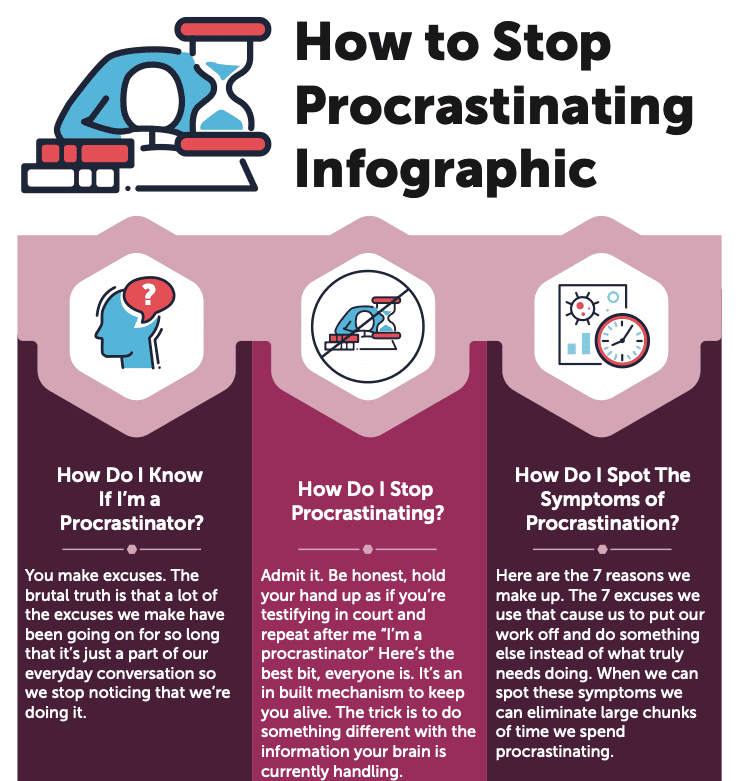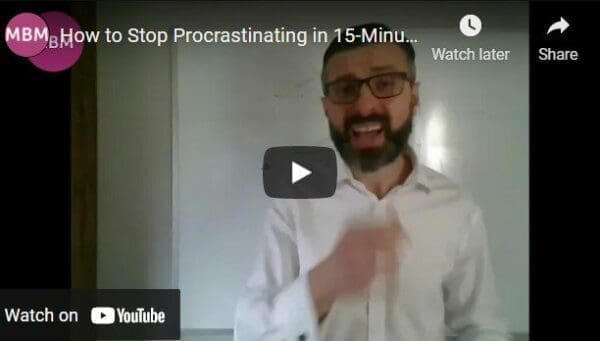We Go to Work With the Best Will in the World to Get That ‘Thing’ Done
To have ‘that’ conversation with ‘that’ person. Yet we struggle, we get distracted, we fall down another rabbit hole or get caught up in a flurry of instant messages, pings, beeps, emails and notifications. Get to the end of the day and realise that thing, that really important, big, influential task. Didn’t get done. In short, procrastination set in.
We swiftly berate ourselves, give ourselves a hard time, instantly play victim to our own tirade and say ‘oh well, I’ll do it tomorrow.’
Next thing you know 3 years have passed and you’re still doing the same thing, having the same internal dialogue about the same challenges. And it doesn’t matter what that ‘thing’ is, I guarantee there is something sitting on that list begging for your attention.
For some reason, we think if we ignore it for long enough it’ll go away, but it never does. Eventually, however, through embarrassment, you remove it off your to-do list. But once it’s been seen it cannot be unseen. Once it’s on the list, it’s always there. That special one that sits at the back of your mind nagging for your attention.
Then, instead of answering the nags, and the pleads for attention with makeup excuses to help keep this to one side and mentally placated so the whines get smaller. Which is why work gets I.G.N.O.R.E.D.
Here Are the 7 Common Excuses We Use to Not Get Things Done:
1. It’s Easy to Not Do It
Tech and social media are constantly screaming for our attention and making it easy to be distracted. The moment we sit down for a cup of coffee we start scrolling, or our email pings in the background we instantly switch windows looking for another valid reason not to what we’re meant to.
2. Get Certainty
We take the easy road, the path well-trodden because it fuels our sense of security. We work inside what we know and can deliver. Moreover, we know what we’ll get and achieve so why create any possibility for mistakes or failure?
3. Nervous (Fear) of Failure
Due to the way we’ve been educated we’ve been taught that right and wrong are a binary equation. As such, we learn that failure is the opposite of success. We then do our best to avoid it in the pursuit of managing our ‘positive’ relationships with our peers and leaders.
4. Overwhelm
We enjoy the feeling of pressure, the looming deadline the pressure that it adds. We get excited for the urgency, the frenzy of adrenaline-fuelled all-nighters. Not only is there a risk of missing the deadline, but the work will also likely be sub-standard as well as impacting your health while you work in this way under stress.

5. Responsibility
You’d rather someone else made the decision, just in case it was a poor choice. In case you feel you missed the mark you’d rather someone else did it and relinquish you of the responsibility, so you hold back.
6. Engaging
The thing you’re meant to be doing simply just isn’t, well, engaging. It’s not challenging enough, difficult enough or emotionally persuasive for you. There is no draw for your attention, so you go looking for something else to do that is.
7. Difficult
On the other end of the scale, it’s too difficult for your current self, you think it’ll be easier tomorrow. Your future self will be better equipped to deal with it then, so you leave where it is telling yourself you couldn’t possibly do it.
If this isn’t ringing true already then let me ask it a different way. Do you have something on this week’s to-do list your putting off? What’s the oldest thing on your mental to-do list, 1-week? 1-month? 1-year? Longer? For the majority, there is something. Sitting unscratched, without a tick next to it or a line run through it.
What Exactly Is Procrastination?
Procrastination is the extension of a behaviour learned through the evolution of the human race that has kept us safe for millions of years.
‘Hold on’ I hear you say ‘how did he just jump to a couple of rubbish excuses I use to validate why I didn’t do something I felt I was Meant to have got done today?’
Easy. Procrastination is a safety valve which kicks in whenever we do something we haven’t done before or makes us feel uncomfortable. Re-read the 7 excuses, they all have a route in Fear. Hiding from things that are difficult, fearful we might make a mistake, might be seen as less for either doing it or trying and failing. When fear kicks in, procrastination is the go-to delaying mechanism that keeps us safe.

Why Do We Procrastinate?
Procrastination first started 200-millions year ago (I know I have something on my to-do but seriously that’s a long time), when we were still scratching around in caves. Before we would leave the cave in pursuit of food and water our amygdala would kick in, reminding us of all the pending dangers and threats we’re about to experience. We’d prepare ourselves and go out and while out it would continue in a state of high-alert which encouraged us to return to safety. This reflex simply applied a certain amount of tension and pressure to help us question whether or not it was worth the effort to risk death.
But now we don’t have Sabre-Toothed tigers to contend with, but our brain hasn’t caught up with that fact. The moment we do something outside of our comfort zone, outside of the safe cave and in the dis-comfort zone, we start doing certain things that keep us mentally safe and inside that metaphoric cave.
The first symptom is always the justification of the in-action or worse action-faking as MJ DeMarco mentions in his book, Unscripted. The art of busy-ness and ticking the other things off the list. By making ourselves busy we make it easy to say ‘I did good work today’ even if the one thing that you know that truly needs attention didn’t get done.
If we spend too much time making the quick wins with miss out on the long-term gains.
How Common Is Procrastination?
In my view, with what I understand about human behaviour, mine included – everyone can procrastinate, and everyone does it at some point in their day, week or year. it’s in-built at a mechanical level. As I said the root cause of our procrastination is Fear. We all do it at some point about something, it’s just what we do with it that makes a difference as to whether we move from momentary procrastination to becoming a full-blown procrastinator.
Does That Mean Everyone Is a Procrastinator?
In short no, at the same time, we all have fears and a sense of fear, it’s the healthy sensation that keeps us alive. When we have an unhealthy sense of them it’s the thing that often holds us back.
We’re only born with 2 fears, the fear of falling and the fear of loud noises. We get these from the get-go, saves us having to relearn this every time we’re born. The rest we learn. The 2 fears that drive the above list of validation reason are, ‘The fear of losing love’, and ‘The fear of not [insert label] enough’.
In the majority, we all have a personally defined amount of these 4 fears. Why do I say personally defined? Because we can unlearn and rewire our approach to certain things and activities. We can retrain ourselves to move beyond what makes us feel uncomfortable, it’s called stepping outside your comfort zone.
Joseph Ferrari, APD Fellow and professor in Psychology puts it this way: ‘
What I’ve found is that while everybody may procrastinate, not everyone is a procrastinator’.
It’s purely how comfortable we are with feeling uncomfortable. In the same way, we can train a dog or horse to not flinch at a gunshot, we can also learn to jump out of the aeroplane without a parachute. Take a look at this video:

Joseph found through his work that around 20 percent of people may be chronic procrastinators. Which is why it’s sometimes asked…
Is Procrastination a Mental Illness?
Wikipedia; ‘procrastination may be symptomatic of a psychological disorder. Procrastination has been linked to several negative associations, such as depression, irrational behaviour, low self-esteem, anxiety and neurological disorders such as ADHD. Others have found relationships with guilt and stress.’
In these cases, one fuels the other. We feel fear, hold back, give ourselves a hard time for not taking the action. We then hand over our mental bandwidth to critical self-talk which then makes us feel even worse. Because we feel bad, we’re less likely to take the action in the future, because we feel more fearful and we downward spiral. The fear elevates and so does the procrastination with the result being heightened anxieties and depressive symptoms. As I said earlier, procrastination is a safety mechanism, when you understanding it’s your brain doing its best to keep you safe you can start to focus it in different ways.
It’s much like an overly protective aunty telling you ‘Don’t go for that job, Great-grandpa Billy-Bob worked there in 1573 and lost 3 fingers in a sewing machine accident… very dangerous…’ It’s coming from completely the best intentions but just not supporting the best possible outcomes. Especially when it’s about job interviews and promotions.
How Do I Fix Procrastination?
Joseph Ferrari continues:
‘As I tell people, to tell the chronic procrastinator to just do it would be like saying to a clinically depressed person, cheer up.’
Let’s flip that acronym around and make sure work doesn’t get I.G.N.O.R.E.D.
Stop Procrastinating Infographic
Take a look at our helpful infographic below. Click the image for a downloadable PDF:

There are seven key reasons why work gets I.G.N.O.R.E.D. Let’s dig a little deeper into these causes of procrastination:
1. Initiate
Set yourself up for success and create what Robin Sharma refers to as a ‘Tight Bubble of Focus’ switch your push notifications off, don’t take the phone to the toilet with you. Switch off Skype so you can concentrate on the tasks at hand.
Ask yourself; ‘What’s the one smallest action I can take on this thing for the biggest possible impact?’
2. Get On
Things are only difficult because we don’t take enough time to practice them or even start them. Yes, at times things feel clunky and uncertainty, that’s life. A baby doesn’t think walking is too tough and decides that’s not for me after it falls 10 times in a row. They keep moving forward.
Ask yourself; ‘Who can I learn from that would show me how to make this work?’
3. Never Say No
‘Say yes and work it out later,’ said Branson. Once you’ve got some momentum, or have committed you’re more likely to take another step, then another and so on.
Ask yourself; ‘What am I actually saying “yes” to, when I say “no” to this? Additional pressure, overwhelm, guilt?’
4. Organise
Rather than adding unnecessary pressure, turning in second rate work or missing a deadline. Plan your activities, Brian Tracy talks about ‘Eating the Frog’, do the hard thing first. And when the frog is too big to swallow in one go, slice it up and turn it into bite-sized chunks you can spread across the time you have. Use your calendar and get systematic.
Ask yourself; ‘Where’s the best place to schedule this thing so it gets done?’

5. Respond
Take an actual action, even a small one. If you sit there not taking any action people will see the dithering and the vagueness which starts to create a perception of who and what you are about. Dan Pena, ‘$50billion man’, love him or hate him says ‘I may be wrong, but I’m never in doubt.’ This one is almost the hardest and the easiest habit to change.
Ask yourself; ‘What are my best 2 options to move this forward?’
6. Engage
By saying yes to this and getting into it, what is this action helping you to achieve? What does it enable to happen; a reduction in pressure, additional bandwidth, clarity for another project down the line? Just because it’s hard or uncertainty doesn’t mean there isn’t a positive pay off.
Ask yourself; ‘What are the benefits to me of getting this done?‘
7. Done
Calibrate and celebrate. At the end of the day take a moment, breathe and check your done list. At the same time take a moment to check-in and see what the valuable lessons were from the experience.
Ask yourself ‘Did it go according to plan? What mistakes were there to learn from to make tomorrow easier?’
Watch the Video
How to stop procrastinating in 15-minutes and get your to-do list done:

It’s Action That Counts
Whether it went as well as expected doesn’t matter too much. The important part is you took an action, that’s what counts. You made a move and are you’re now creating an understanding that you may have procrastinated, what you’re definitely not is a procrastinator.
Congratulations, you’ve fixed procrastination and made the to-do, done.




